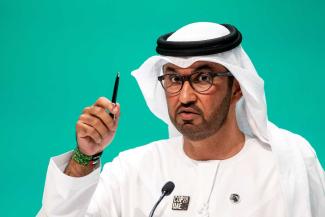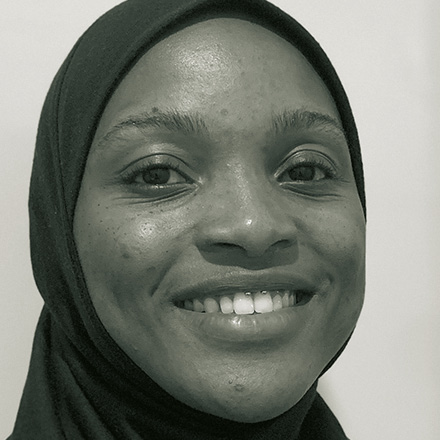Global governance
In world affairs, “person of colour” is a misleading term
 picture alliance / EPA / MARTIN DIVISEK
picture alliance / EPA / MARTIN DIVISEK
In BIPoC terms, Kamala Harris is both Black and a person of colour but must also be suspected of promoting white supremacy. As vice president, after all, she represents the world power deemed to be imposing its racist standards on the world in an imperialist manner. In the USA, of course, white supremacists resent her. The BIPoC concept does not help to really understand her role – whether at the national or the international level.
Rishi Sunak, Britain’s prime minister, is a leading a rigidly right-wing government. However, his cabinet includes several BAME people. The acronym BAME is the British equivalent of BIPoC and stands for “Black, Asian and minority ethnic”. Sunak belongs in the “A” category and so does former Home Secretary Suella Braverman. James Cleverly, the current home secretary (previously foreign secretary) and Kemi Badenoch, both belong in the “B” group.
In global affairs, Britain’s government is nonetheless playing an increasingly destructive role, scaling back climate ambitions and trying to outsource its asylum obligations to Rwanda. At the domestic level, it shows little interest in expanding social benefits and the kind of educational spending that promote upward mobility among disadvantaged people, whether they belong to the white working class or a BAME community.
It is easy, of course, to accuse the likes of Sunak of being traitors who betray their own community. But that only makes sense if you accept that skin colour somehow defines who or what you are. Sunak takes pride in being a pharmacist’s son, emphasising both the educational and entrepreneurial achievements of his mother. His father worked as a medical doctor for the National Health Service. In other words, he is proud of not belonging to the working class.
Sunak’s parents sent him to Winchester, an elite private school. He then went to Oxford University, worked for Goldman Sachs and eventually obtained his MbA from Stanford University in California. That is where he met Akshata Murty, to whom he is now married. Her father Narayanan Murthy made billions of dollars as a co-founder of Infosys, one of India’s big tech companies.
Sunak’s family is thus richer than the families of previous prime ministers were. So no, he did not abandon his community. It is absurd to assume that lumping him in the “Asian” category somehow obliges him to act in solidarity with working-class Britons of Pakistani or Bangladeshi origin.
It is equally bizarre to expect Sunak to feel a strong sense of solidarity with masses of disadvantaged rural people in African and Asian countries. All too often, not even the top policymakers of those countries do so. Governance in former colonies tends to be rather authoritarian. All too often, it serves the privileged few, not the deprived many.
The idea that all grievances can and should be traced back to the misdeeds of the imperial powers only helps to explain the current misery prevalent in much of the world to a limited extent. This kind of postcolonial thinking fails to take into account that the governments who took over after liberation and those that succeeded them bear responsibility too.
Who can speak for the “global south”
Some people believe that all countries that suffered under colonialism now share a mutual sense of solidarity. This belief distracts attention from serious conflicts of interest. The territory that is now controlled by the Gulf monarchies used to be part of the Ottoman Empire. Do these high-income countries belong to the global south?
The United Arab Emirates hosted the latest UN climate summit. Sultan Ahmed Al Jaber, the Emirati leader who served as the event’s president, played a major role in preventing the demand to phase out fossil fuels in the final document. He is the top manager of the national oil company, and his business interests clearly trumped his concern for the common global good. Even the USA was in favour of agreeing on more consequential language.
In the USA, Arabs are today generally considered to be “persons of colour”. The reason is that there are instances of anti-Arab discrimination. My hunch is that it is probably more about anti-Muslim discrimination, which is not related to skin colour at all. People from around Mediterranean Sea tend to have pretty much the same skin colour. Complexion is not a reliable guide for telling whether someone is from Turkey, Egypt or Spain. Using the PoC metaphorically to distinguish former colonial powers from their victims leads to confusion too. Turkey was not colonised, it is the successor of the Ottoman Empire.
It is noteworthy that group of the BRICS (Brazil, Russia, India, China and South Africa) has not assumed serious leadership regarding climate issues. To judge by skin colour, the top leaders of India and China are PoCs while their South African counterpart is Black. The top policymakers of Russia and Brazil do not look like BIPoCs.
As I have argued before, the BRICS claim to speak for the global south, but they are increasingly aligning with OPEC. That shows they are keen on using fossil fuels, but less interested in democratic governance. Indeed, Sultan Al Jabar’s Emirates are set to join the BRICS. According to the World Bank, that country’s per-capita GDP ($ 88,000 in purchasing power parities in 2022) is higher than the comparative figures for the USA, Germany and other large western nations.
Why are the BRICS not leading?
If it is part of the global south, that term does not make sense. Indeed, I think we should stop using the term. I think it is increasingly serving Chinese propaganda. Beijing wants us to believe that persons of colour have shared interests and that the global south is a coherent concept. The implicit message that Chinese diplomats are spreading is that the nation is the benevolent supporter of all historically disadvantaged people around the world. The point is to divert from the huge influence the second most powerful country on earth already has.
If you do not agree, consider the case of Sri Lanka’s debt crisis. Chinese loans that were granted to top policymakers who belong to the powerful Rajapaksa clan contributed to Sri Lanka’s government becoming over indebted. It went into default in 2022, and a public uprising removed the Rajapaksas from power. The debt, of course, has not gone away. Sri Lanka meets debt relief, and among the creditor governments, the one in Beijing is the least willing to forgo outstanding money.
Hans Dembowski is the editor-in-chief of D+C/E+Z.
euz.editor@dandc.eu





